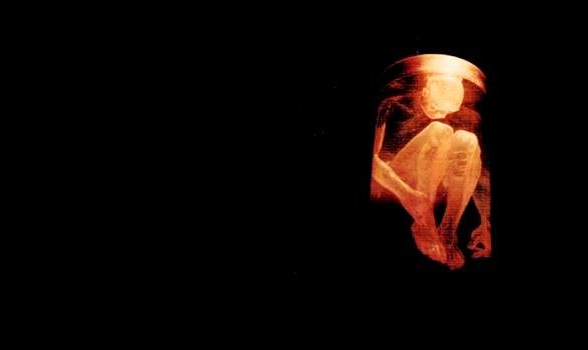
by Fr. John Breck
At the end of each January we commemorate “Sanctity of Life” Sunday and focus our attention on the tragic number of abortions in the United States and elsewhere throughout the world. It’s a time when we again recoil from the realization that the highest abortion rates, as far as we know, occur in “Orthodox” countries. It seems appropriate, then, to consider once more the “status of the unborn,” and prevailing attitudes in our own country that permit and even encourage the destruction of the not-yet-born.
When the House of Representatives approved the “fetal protection bill” on April 26, 2001, the non-voting Democratic representative from the nations’ capital, Eleanor Holmes Norton, was reported by MSN News as calling the bill
“clearly unconstitutional.”
She specified the reason for her judgment as follows: the bill
“defines the fetus as a person in direct, in-your-face violation of Roe v. Wade.”
That piece of legislation, crafted by the late Justice Harry Blackmun, claimed that
“the word ‘person’ as used in the Fourteenth Amendment, does not include the unborn.”
In a similar denunciation of the fetal protection bill, NARAL (the National Abortion Rights and Reproductive Action League), joined by Planned Parenthood and other pro-choice groups, declared that the legislation would give the fetus rights
“separate and equal to those of a woman and worthy of legal protection….”
As clearly as Roe v. Wade itself, the fetal protection bill forced us to consider once again the status, both legal and moral, of the unborn human from conception to birth.
Ostensibly, the bill aimed only to make it a crime to harm or to kill the fetus of a pregnant woman during a violent offense committed against her person. The perpetrator could, in other words, be charged with two separate crimes, one against the woman herself, and a second against the child she is carrying. In effect, this legislation simply laid out in modern terms what the ancient Israelites accepted as law over three thousand years ago:
“When men strive together, and hurt a woman with child, so that there is a miscarriage, and yet no harm follows, the one who hurt her shall be fined….If any harm follows, then you shall give life for life, eye for eye, tooth for tooth… (Exodus 21:22f).
Scholars do not agree on who exactly receives the harm in this passage. One reading understands the child to be dead because of the miscarriage, so concern is only for the woman. In this case, it could be argued that the fetus has no legal status. Another reading holds that the passage speaks of an act that leads to premature birth, and that the harm in question refers to the child. If this reading is correct, the unborn child is recognized implicitly as being fully human and worthy of legal protection.
In any case, the Septuagint or Greek translation of the Old Testament, dating from the third century B.C., clearly understands the object of harm to be the unborn child. A distinction is made between a “formed” and an “unformed” fetus: If the child is born in an “unformed” state, the person who struck the blow must pay a fine determined by the woman’s husband. If the child is formed, however, the offender will suffer damages equivalent to those suffered by the child, including death.
According to Israelite law, then, provoking the fatal miscarriage of a near full-term fetus merits the death penalty.
This ancient legislation is part of the Book of the Covenant that has shaped Jewish and Christian moral perspectives to the present day. Israel’s moral vision was transformed and elevated by Christ, who called in the Sermon on the Mount (Mt 5-7) and elsewhere for what has been called a “greater righteousness” than that of the Pharisees. Yet Christ’s New Law stands in full continuity with the Law of Moses.
Science and politics often mix no better than oil and water. Although embryology may confirm that human life exists both genetically and developmentally from conception, concern to placate “pro-choice” advocates has led all three branches of government to preserve the “right” even to such late-term procedures as “partial-birth abortion,” an act of undisguised barbarity.
While many abortion opponents are trying to overturn Roe v. Wade and similar legislation, working as it were from the bottom up, it may prove more effective to reverse course and begin with the most egregious practices in the abortion business. President Bush has expressed clear opposition to partial-birth abortions. If they could be outlawed, then this would go a long way toward confirming what Jewish and Christian traditions have always known: that life in the womb is human life, worthy of legal protection. Then it would be necessary to work incrementally backward, eventually to eradicate from the public’s mind the false distinction between “child,” “fetus” and “embryo.”
Science operates on the basis of knowledge; politics, on the basis of pressure. It is up to each of us, in appropriate and peaceful but very firm and relentless ways, to apply that pressure. Then eventually we may make it beyond this tragic moment in our history, marked by a level of self-interest that allows incipient human life to be sacrificed in the interests of cloning, the harvesting of embryonic stem cells, and partial-birth infanticide. Then finally we might acknowledge and affirm, through public policy as much as through religious conviction, that the “status of the embryo” is none other than the status we enjoy ourselves, as citizens endowed with certain inalienable rights, and as persons endowed with the Image of God.